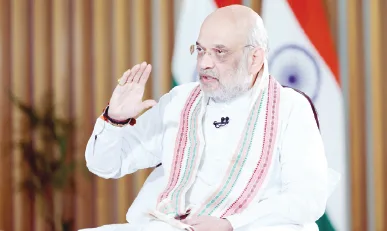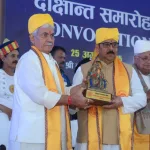Jammu, Aug 25: Union Home Minister and Minister of Cooperation Amit Shah, in a wide-ranging interview with a news agency, strongly defended the Constitution (130th Amendment) Bill, 2025, stating that no Prime Minister, Chief Minister or Minister should be allowed to run a government from jail.
In a press release issued by PIB, Calling such situations an “insult to democracy,” Shah said, “It does not suit our democratic values that Secretaries or Chief Secretaries of governments have to go to jail for orders from leaders who are themselves behind bars.”
In a press release issued by PIB, the proposed amendment mandates that if any Prime Minister, Chief Minister, or Minister is arrested under serious charges and fails to secure bail within 30 days, they will be automatically relieved of their post. Shah clarified that this clause applies uniformly, including to the Prime Minister, marking a break from the precedent set by the 39th Constitutional Amendment, which had excluded the Prime Minister from similar scrutiny.
“Modi ji has brought even the office of the Prime Minister under the purview of this law, unlike the 39th Amendment passed during the Congress era,” Shah said.
Shah informed that the 130th Amendment Bill would be sent to a Joint Parliamentary Committee (JPC), and emphasised that the two-thirds majority required for its passage ensures debate and deliberation.
“It is constitutionally valid to oppose a bill and vote against it. But disrupting Parliament to block its introduction is undemocratic,” he said.
He criticised the opposition for creating noise instead of engaging in debate. “Parliament is for discussion, not disruption. The mentality of not allowing bills to be presented will have to be answered to the people.”
Shah cited instances of ministers in Tamil Nadu and the Chief Minister of Delhi continuing in office despite being jailed.
“Should the Chief Secretary or DGP go into jail to receive instructions from jailed leaders?” he asked, adding, “Our Constitution’s framers never imagined a time when governments would be run from behind bars.”
The bill defines “serious crime” as one carrying a sentence of five years or more, and parallels existing provisions in the Representation of People Act, which disqualifies elected representatives upon conviction for two years or more.
He asserted that courts remain fully empowered to grant bail in legitimate cases. “If a case is fake, the High Court or Supreme Court can grant bail. But if bail is not granted within 30 days, the person must step down.”
“If bail is granted later, they may take oath again. But there must be a standard of morality,” Shah added.
Responding to allegations of political vendetta, Shah pointed to his own past. “When I was summoned by the CBI, I resigned the very next day. I did not return to public office until I was fully acquitted,” he said, referencing a court ruling that dismissed charges against him as baseless and politically motivated.
He said that moral standards should not depend on electoral victory, but must be constant “like the sun and the moon”.
Shah denied the bill is targeted at any party or individual. “This bill is not against the opposition. It applies equally to everyone,” he said, emphasising that PM Modi has set a new benchmark for accountability by including his own office under the law.
“It’s unfortunate that the opposition sees moral standards as political tools,” he said. “If someone is neck-deep in corruption, they should go to jail and also resign.”
Shah also accused the opposition of misleading the public by claiming that FIRs are not filed against ruling party leaders.
He reiterated that the government is open to discussion, but the opposition must participate responsibly in the parliamentary process.
“The government has offered a platform for all parties to give their input. If they boycott even the JPC, the public will judge them.”
Shah expressed confidence that the bill would pass and that many in the opposition would eventually support it based on moral grounds, rather than political expediency.






